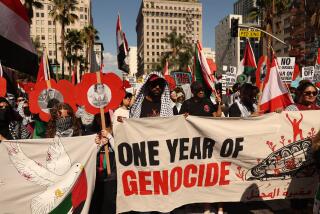A Pep Rally in Jerusalem Is a Cry for Peace
JERUSALEM — Their voices are rarely heard these days. Gathering Friday inside the Old City’s Jaffa Gate, hundreds of Israelis and Palestinians made an impassioned plea for peace, for an end to bloodshed and, most unusually, for a partnership between the two peoples to achieve those goals.
After pushing through a gantlet of extra Israeli police, the activists, politicians and academics crowded into an Old City hotel, signed a “declaration for peace” and launched a campaign to restore the pursuit of peace to the national agenda.
Touchy-feely events such as this were once common here. But in the last 15 months of Israeli-Palestinian violence, they disappeared. The Israeli left that had long supported peace efforts all but collapsed, and Palestinians and Israelis became increasingly radicalized as the death toll mounted.
So organizers were delighted at Friday’s turnout for a meeting that many participants said could not have happened a few months ago. Israelis rarely venture to the non-Jewish parts of the Old City, and Palestinians rarely want to be seen cooperating with Israelis.
Coming Together Out of Desperation
It is unclear whether there is much public support for this effort. Among Palestinians and Israelis, the wellspring of hatred and the thirst for revenge are enormous, the voices of extremism drowning out any spirit of reconciliation and compromise.
The fact that several hundred Israelis and Palestinians came together Friday reflected a desperation and despair from which participants said hope might spring.
“This is extraordinary,” said Galia Golan, a founder of Peace Now, an Israeli antiwar movement that helped organize Friday’s meeting. “This shows there are still people who believe peace is possible.”
Echoing her sentiments was Sari Nusseibeh, the top Palestinian official in Jerusalem and president of Al Quds University in East Jerusalem; he has emerged as a widely respected moderate.
“This today gives us hope to take more, more important steps,” he said, before releasing a bevy of white doves from the hotel’s wrought-iron balcony to a smattering of cheers.
The activists said they were motivated by a growing sense that leaders on the two sides are incapable of bringing peace, while they believe that most people on both sides do want peace.
“For the first time, we are not hearing people yelling hatemongering and race-mongering slogans--death to Arabs, death to Jews. We are sick and tired of it,” said Albert Aghazarian, an administrator at Birzeit University in the West Bank.
“We will make a difference; you can see the difference,” he said, pointing to the crowd.
Among leading Israeli politicians were several members of the Labor Party, which sits in Prime Minister Ariel Sharon’s coalition government, as well as leftists. Palestinian politicians represented an array of factions, including Palestinian Authority President Yasser Arafat’s Fatah movement.
Golan said it is easier for Israelis to participate now that Arafat has formally called for an end to violence and Sharon has presented no political solution to the conflict. And Palestinians may see an urgency in finding alternatives in the days since Arafat has been isolated and rendered largely impotent.
‘This Is a Message of New Hope’
The underlying purpose was to show each other, and anyone else who might take notice, that Israelis and Palestinians can begin to work together again. And that refusing to talk to each other--to regard the other as “irrelevant”--will only doom the region to interminable bloodletting.
“This is a message of new hope,” said Yossi Sarid, head of Israel’s main leftist opposition party. “Israelis are always saying, ‘Where is the peace camp on the other side?’ Well, here it is.”
Samaan Khouri, a senior official in the Palestinian Authority’s Ministry of Culture, gave a similar appraisal, from the opposite perspective. “This shows Israelis longing for peace,” Khouri said. “Palestinians have been looking for this.”
The agenda of what participants are calling the Israeli-Palestinian Coalition for Peace would in today’s climate be considered the left end of the political spectrum. The solution to the Middle East conflict, the coalition says in a three-point manifesto, is the creation of a Palestinian state next to Israel; the removal of Jewish settlements from the West Bank and Gaza Strip; and a sharing of Jerusalem, which both Jews and Palestinians claim as their capital.
Although there was quite a bit of enthusiasm at Friday’s pep rally, no one was expecting an immediate breakthrough.
“Considering the political context, this is a big step,” said Didi Remez, another organizer from Peace Now. “We have to start somewhere.”
More to Read
Sign up for Essential California
The most important California stories and recommendations in your inbox every morning.
You may occasionally receive promotional content from the Los Angeles Times.











